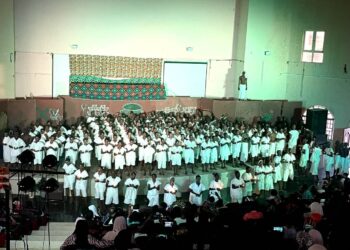Photo credit: Oyetunji Sukura Bolanle and Adeniran James Adeyinka
‘Tunji Solomon

ÌBÀ, the three letter word that announces the obeisance, respect, reverence and homage paid through the staged plays debut of Theatre Arts Department of Ladoke Akintola University of Technology (LAUTECH ), Ogbomosho; is a reminder of Nigerian and first African Nobel Laureate winner, Wole Soyinka’s You Must Set Forth at Dawn: A Memoir; of its dedication page: “Ìbà – for those who went before”. The construction echoes the timelessness and importance of honour being given to the veterans and the first step in the journey of life within the Yoruba culture and traditions. In our own case, LAUTECH Theatre Arts induction!
LIKE A pregnancy whose delivery has come: the expectation was high, the tempo was geometric, the audience stormed the box office like ants on sugar cubes; unlike Chinua Achebe’s evergreen literature: Things Fall Apart; things fell in place at Ladoke Akintola University of Technology, Ogbomosho (LAUTECH) Theatre Arts induction. From the outset, it is obvious that with the addition of Faculty of Arts and Social Sciences (FASS) and various departments within its contexts, things will never be the same again, for good! Promises were made, promises were kept! Thank you for given the audience an afternoon to remember!
LIKE THE coming of the morning, the stage was set through the serenity, the echoes of drum beats and theatrical footfalls. Coincidentally, the selected drama for the induction comes at a critical time. The play is an inspiration that reminds us of Nigerian narratives of many colours, themes and characters involved. Nigeria is too blessed!
WELCOME TO the world of Theatre Art Department – where creativity and ingenuity are set before the audience; where a new chapter was open and history, rewritten! LIke the fate of purpose and orientation with good intent, the debutant drama and the deliveries didn’t disappoint, or left the audience looking lost. The audience find themselves after losing themselves in the fumes of suspense and waves of transition from one scene to the other through sonorous melody. As Bob Nesta Marley once said via his album: there is something good about music – it gives no pain!
THE COMMENCEMENT of the induction begins with high tempo. It was a long afternoon that walked into the evening, and highly filled with memories of outstanding performances! Such is the feeling whenever a debut is made through scintillating performance from insightful critical examination of human existence through drama.
The Wizard of Law cannot but remain timely and timeless as a gift to a nation in search of truthful living (devoid of deception and manipulation); as constant features of daily life of many couples, folks in other walks of life, and as a satire of human follies.
TO BEGIN with, the opening scene came with a life of its own with women who robed themselves in typical Yoruba muslim women dress in traditional attire. The scene fades out for the satiric barbs of Zulu Sofola to unveil and reflect the dominant characters: Sikira, with bad mood and sarcastic song hurls as innuendo against her husband: “Eni ti e ti jona, ko ni ko na mon ti wa” (that’s, who has suffered misfortune will not be contagious to one’s fortune).
MOREOVER, SHE is a typical loyal wife who loves to protect her husband and equally confront him one-on-one. A very smart and intelligent wife. She is a frustrated wife too, a victim of deceit and manipulation by her husband: Ramoni – who is a deceitful husband, manipulator, who dubbed as The Wizard of Law himself, a subtle eponymous character. Ramoni, as symbolism, uses his position and privileges to swindle, cheat and subject others to his treachery. He didn’t fail to remind us of human nature either.
THOUGH THERE is no future in the past, Sikira reflects on what could have been, had it been she got married to one of her suitors 20 years ago, due to the fact that the present life she finds herself in (with Ramoni as her husband who denies her of luxury of life), is not pleasant. As the saying goes: whoever remembers the pleasure of the past, does not enjoy the present. Many people live in regret of action not taken in the past too.
TO CALM the nerves of a bitter wife, Ramoni offers Sikira a blank cheque of request towards coming festive season. “Ask, just ask and I will do it for you”, Ramoni boasted. “Where will you get the money? Do you have money? Tell me”, Sikira ridicules her husband. I said “ask and I will do it”, Ramoni responded in emptiness of substances but gimmick to fulfil the her desires. “Okay (with a probing look and stares that could naked Ramoni) I want Bebetin Lace”, Sikira replied. “I will get it for you”, Ramoni submitted as he repeatedly shakes his head like Agama lizard. As he was about leaving her presence, he asked: “Your shoe size to match your Bebetin lace? Bring your leg”. Sikira reluctantly offers her leg and he measured nothing in particular. Conflict is born. Time out.
LIKE JOHN Updike’s evergreen statement: “Dreams always come true, if not for that possibility, nature will not incite us to have them”. Ramoni who always have his ways with words, did not hesitate to go to the market to meet Rafiu and cajoles him to his whims and caprices, in order to get Bebetin lace at all cost. His treachery worked effortlessly. Rafiu, a famous merchant of clothes, social and generous, but timid of law. He is a victim of law too.
SIKIRA IS excited by fulfilled dream of getting Bebetin lace for Sallah celebration through her husband, Ramoni – The Wizard of Law himself! He didn’t tell his wife he got the cloth on credit or manipulation, he only offers his wife the pretence and faked sickness as alibi to outplay Rafiu – who he had promised to pay when he comes to his house to come and eat rice and stew. Hilarious. At first instance, Rafiu gulliblly fell for the card played on him by Sikira – a script offered by her husband. When he eventually realised their game plan, he became clueless and submitted to fate! Alas! He lost 180,000 Naira Bebetin lace to Ramoni and his wife.
SUBSEQUENTLY, the theme moves faster to Akpan – who is now a victim of intrigues of Rafiu who alleged him of stolen his goats. To save his neck from jail term, Akpan approached The Wizard of Law himself, Ramoni. Who didn’t blink to script a manipulative way out of the web Akpan finds himself. “Akpan, you are now a goat”, Ramoni scripts: “You speak like goat, you breathe like a goat”. Akpan agreed to his game plan and Ramoni didn’t hesitate to bill him heavily. They haggled over the payment.
AT THE court of law, the intrigues played out and Akpan delivered as scripted. The judge and judgement favoured Akpan against Rafiu – a bitter man in all ramifications. Based on the judge’s statement: “Akpan needs to be medically attended to and be restored to sound human state as requested by Ramoni his lawyer, while Rafiu is detained”. On service payment, Ramoni is caught in his own web of deceit, treachery and manipulation. Because Akpan, while crawling like goat and responds like goat, says: “How can I pay you when you heard the judge said that I needed medical attention and be restored to sound human condition?” Conflict resolved. Light out.
KUDOS MUST be given to the efficient usage and deployment of literary tools like: mime, aside, soliloquy, and rhetorical questions. Thanks to the usage of freeze as theatre directorial concept, coupled with the energetic stage-hands for their smartness, creativity and ingenuity. The transition songs from one scene to the other and sustained tempo are highly remarkable. The stage was alive with creativity borne out of commitment and dedication to the task. Thank you for the sustained tempo. No doubt about it, stage performance is an herculean task made simple via excellent delivery. Thanks to the world of Zulu Sofola’s piercing arrows of thought and sober reflections, the innocent staring looks of innuendos and jabs from puns, and dominant metaphors from the playwright. Like Femi Osofisan’s Kolera Koleji (a novel adapted into play with Dexley Lynders), The Wizard of Law reminds everyone of tempest of life and the greed of the privileged class – who should know better. We all know the trade marks of playwrights.
THERE IS no better time to witness the aura, comportment and prospects of Theatre Art students than from the outset of their performance at 100 Level. Remarkable is the fact that while the performance was outstanding and left memory behind, the inductees and the Theatre Art Department deserve more encouragement: the ticket should go up a bit around 600 or 700, or 3 people at 2,000 Naira rate respectively. When quality performance is delivered and repeatedly offered to the audience, the ticket price is often forgotten in satisfaction. It becomes an identity too!
THE DANCE Performance was a refreshment for the soul. Thanks to the arrays of melodious and soul-lifting songs, yet, recreational dance steps. The theme of Wounded Nation echoes the reality no Nigerian can hide from: general declining state of respect as a virtue, courtesy and manners of approach against national interest, elders, socio-cultural existence, and general state of affairs. Homage was paid to God. ancestors, elders and the audience in creative ways. It was an afternoon to remember!
MUCH APPRECIATION for the colour added to the induction ceremony by the Priest in attendance, the renowned Nigerian and Yoruba theatre icon: Peter Fatomilola (with his son Abidemi Fatomilola) and the Priestess: Dr. Mrs. Adeola Faleye; along with Ancestor: Olalekan Omowonuola;
Ancestress: Mobolaji Abodurin, and the 117 pioneer inductees. Notably, LAUTECH thespians were declared inducted into the world of Theatre Art by the Head of Department, Prof. T. Oloruntoba-Oju.
BEING AN excellent performance from the newbies into the world of make-believe, this reviewer believes strongly and convinced that there is nothing to take-away as negative aspects of the drama, dance performance and induction. The standard can only go higher. They have show-cased art, learning, culture and cutting-edge technology in theatrical productions. Surely, Theatre Art has landed in LAUTECH and it has occupied its space. As Francis Bacon once said: “Seeing is believing”.
The Theatre Art Department cannot but be grateful for the support from the: Pro-Chancellor, Prof. Deji Omole. Appreciation also goes to the Vice Chancellor, Prof. R. O. Rom Kalilu; the Dean of Faculty of Arts and Social Sciences, Prof Temisan Ebijuwa, member of the university administration and Ogbomosho community at large. As Oscar Wilde once said: Memory is the diary we all carry about”. That’s it. Theatre is life. Let it catch up with you!
– ‘Tunji Solomon
*Winner:
2017 Sam Omatseye’s 30th Anniversary Journalism Practice Book Prize.
2016 SLAM Youths Hero Award: Rising Star of The Year.
2008 Most Committed and Dedicated Correspondent – North, THE NATION Campus Life.
#
You can get every of our news as soon as they drop on WhatsApp ...To get all news updates, Join our WhatsApp Group (Click Here)












This is so inspiring! Well organized as if watching a stage playlet. More wisdom and have a giant stride.
This is a new dawn at Lautech, we need to support and encourage this department in order to propagate the rich culture and tradition of the black race. Kudos to the writer!